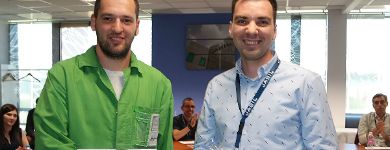La historia de la cultura de Jabil comienza con su gente. Todos los días, nuestros empleados se sienten capacitados y empoderados para ser innovadores, arriesgarse y hacer que Jabil progrese.
Nuestra cultura se manifiesta por medio de nuestros valores fundamentales de integridad, ingenio e inspiración. Estos valores guían nuestras acciones, tanto dentro como fuera de la planta de manufactura. También nos unen a lo largo de todos nuestros centros en todo el mundo.
La cultura de Jabil se destaca a través de programas enfocados en los empleados que reconocen las contribuciones de los empleados, fomentan la mejora continua, marcan la diferencia dentro de la comunidad y estimulan las conversaciones sobre diversidad e inclusión.
Entendemos que nuestra mayor fortaleza es nuestra gente y las diferencias que cada uno aporta a la empresa. También sabemos que un lugar de trabajo diverso e inclusivo fomenta la innovación, desarrolla ideas y ofrece nuevos puntos de vista que redundan en beneficio de nuestros clientes.
Lo que hace que Jabil sea diferente es también lo que hace que seamos grandes. Descubre todas las formas en que nuestra cultura nos impulsa a ser el proveedor de soluciones de manufactura con la mejor tecnología y la máxima fiabilidad.
Forma parte de la cultura Jabil y consulta la lista de vacantes disponibles actualmente haciendo clic aquí.

Somos Jabil
-

Mejores Prácticas
Nuestra competencia de mejora continua que premia, apoya y promueve los avances en los procesos.
LEARN MORE -

Rostros de Jabil
El éxito de Jabil comienza con su gente y consideramos que nuestros empleados son una de nuestras mayores fortalezas y la verdadera ventaja frente a la competencia.
LEARN MORE -

Respeto, Reconocimiento y Recompensa
Nuestro programa de reconocimiento mundial permite a nuestros empleados recibir apoyo por su excelente desempeño y su compromiso de ayudar a los demás.
LEARN MORE -

En la Comunidad
Jabil se enorgullece de retribuir a las comunidades locales creando oportunidades para que los empleados se involucren e impulsen un cambio positivo.
LEARN MORE -

Jabil Joules
Este programa sirve como plataforma para crear un diálogo abierto en torno a la diversidad y la inclusión a través de foros educativos, tutorías y actividades de participación comunitaria.
LEARN MORE -

Carrera Profesional
Para Jabil, contar con una base de personas maravillosas es más que una afirmación, es la forma en que desarrollamos nuestras actividades todos los días.
LEARN MORE





